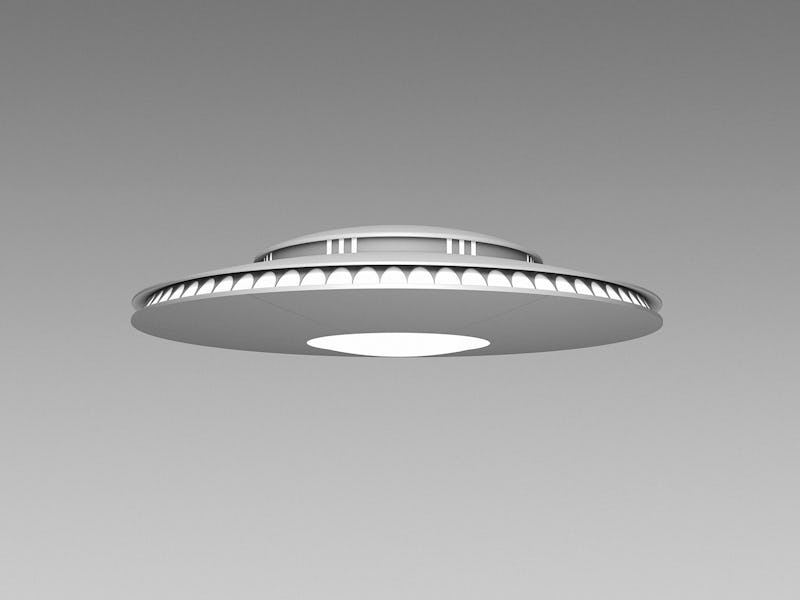Meet the UFO Expert Who Doesn't Believe in Aliens
Jack Womack's fascinating research of flying saucers say more about human beings than visitors from beyond.

One of the world’s foremost experts on the subject of flying saucers doesn’t believe in alien abduction, little green men, or government cover-ups one bit. Instead, author and saucer aficionado Jack Womack is interested in the people who believe that they’ve seen UFOs. He’s so fascinated by these true believers, in fact, that he’s collected nearly every single book — some of which there were only handful of copies printed — by authors who claim to have seen flying saucers.
“I can study TB without catching it, preferably, and I can be a student of the Bible without being a Christian,” Womack says, explaining his intense interest in these claims without actually believing any of them. “I collected these books because they gave me the same kind of escapism kicks other people get from reading science fiction, or my friends get from writing it.”
Over the course of several decades, he amassed a vast collection of UFO books, so many in fact, that his collection is now referred to as a library. Last month, a selection of Womack’s vintage books were on display at the Milk art gallery in New York City, ahead of his new book’s launch, cheekily titled …Flying Saucers Are Real!
Jack Womack at the Milk Gallery
Womack begins his book by chronicling the publication of Richard Shaver’s story “I Remember Lemuria!” in a March 1945 issue of Amazing Stories. Shaver’s story of alien creatures dwelling in caverns below the Earth is notable because it was sent to Amazing Stories as non-fiction, and rewritten by an editor named Ray Palmer for publication. As such, a story which many UFO or alien conspiracy theorists would consider to be “true” was the work of a desperate fiction editor retooling a letter from a madman. But if the Shaver stories were the beginning of UFOs crossing over into science fiction, when was the start of journalists writing about them?
The Shaver "Mystery" is a mainstay of UFO lore
“A patient zero,” Womack says, “would have been Kenneth Arnold’s 1947 sighting.” Arnold was a commercial airline pilot who saw “nine reflective disc-like objects” on June 24, 1947. Arnold repeated this information over the radio and then later to an editor. Eventually, a story was published — without a byline — by Hearst International in which the words “flying saucer” were first used.
Detail of 'Those Sexy Saucer People.'
In his forward to …Flying Saucers are Real!, science fiction legend William Gibson (“the inventor of cyberpunk”) likens the 20th century obsession with flying saucers to “what we now think of as a meme.”
Accordingly, the history of flying saucers and alien abductions can then be seen as a series of different copycat claims. The reason why believers all see the same oval-eyed grey aliens is because the delusions seem more real if they’re shared. If you’ve seen that Saturday Night Live sketch where Kate McKinnon’s alien abduction account diverges considerably from two other abductees, Gibson’s notion of UFOs being a “meme” in some kind of collective unconscious starts to make hilarious sense.
Gibson also writes that the books authored by UFO-believers are “testimonials to certain human needs.” But what needs are these specifically?
“The desire for there being something, anything, beyond this life,” Womack speculates, “whether you are religious or not.”
In X-Files parlance, that word — “belief” — might crop up in a philosophical or psychological discussion. But belief in what exactly? There’s a pervasive notion that the best conspiracy theories are the ones that are hardest to prove. One of the more interesting accounts in Womack’s book tells of the first flying saucer convention held in Los Angeles in the late 1950s. Supposedly, one of the guest speakers of this convention was a mysterious figure called “Dr. X.” Here, Womack’s debunking mind fires off like a sci-fi laser blast, telling Inverse that though many repeated the existence of Dr. X. at this early convention, he was unable to locate other details in his research.
“No one ever claimed to be Dr. X,” Womack told Inverse, “and his brief appearance comes across as fishy as can be.”
Jack Womack explains the finer points of his collection
While Womack finds most of the books he’s acquired over the years amusing, he does have a tenderness toward the material. Are any of the books well-written? Enjoyable, even as artifacts of a desperate human need to believe? Womack claims that Flying Saucers on the Moon by H. J. Wilkins is legitimately well-written and good, though even that comes with an asterisk: “Well-written in the sense that Wilkins’s style is so over the top and he is so gullible that this and his other books are endlessly entertaining,” Womack says.
What’s the worst-written, most insane book in his collection? That would be a book called Bizarre Shaver, a takeoff of the infamous Shaver stories which arguably started so much of the flying saucer craze in the first place. To be fair, though, “the author is schizophrenic,” Womack adds.
A selection from Womack's collection
In the 21st century, flying saucer sightings and the literature associated with those alleged experiences have decreased dramatically. Womack suggests that this is largely because of the fact that “everyone has cameras now,” which makes “documentation” of UFOs far harder to produce. If video killed the radio star, then the camera phone certainly made it harder for the flying saucer nut to continue to create reasonable doubt in the mind of a skeptic.
Still, Womack isn’t mocking the human desire to believe in something bigger beyond the stars. Instead, Womack celebrates a plurality of beliefs, overlapping, some competing, some desperate, but all of them — especially the tales of grey aliens — thoroughly human.
…Flying Saucers Are Real! is out now from Anthology Editions.
Jack Womack’s UFO Library is now permanently housed at Georgetown University.